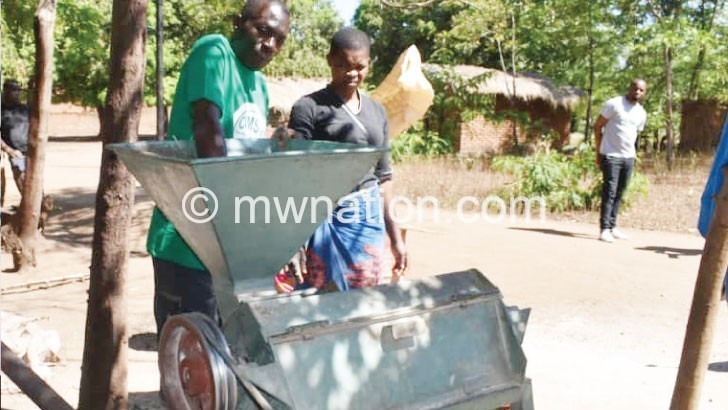Man discovers niche in road project
Ketera Bikosi Kapira from Chapinga Village in Traditional Authority Mlolo’s area in Nsanje is one of the people affected by the Thabwa-Chitseko-Seveni Road project.
The Roads Authority (RA) is rehabilitating and upgrading drainage systems of the road, commonly known as the East Bank Road, with financial support from the World Bank under the Malawi Floods and Emergency Recovery Project (Mferp).
The project has displaced some people, including Kapira, from their homes and business interests along the corridor, leading to loss of livelihoods.
Kapira, 55, lost four shops and received K4 million as compensation.

The money rekindled his long-harboured ambition of owning a maize mill. Upon receipt of the compensation, Kapira quickly invested K2 million in a maize mill with an electric motor.
Initially, Kapira planned to plant an electric-powered maize mill near Fatima Trading Centre in Nsanje, but he did not succeed as the place is located away from Electricity Supply Corporation of Malawi (Escom) power grid.
“I was asked to pay Escom K6 million to tap power for the business. I was frustrated because the amount was too much for me. As such, I abandoned the plan,” he says.
For several months, Kapira resigned to his own fate. Out of frustration, he spent the money that was left on non-essential things.
Nevertheless, his dream roared back into life with the introduction of Community Savings and Investment Promotion (Comsip) project aimed at restoring lost livelihoods of people affected by road project in his village.
The RA, under whose mandate the road project is being implemented, engaged Comsip to teach project affected persons (PAPs) on how to manage the money realised from compensation.
The villagers were taught how to identify, develop and implement business ideas as well as the importance of embracing a savings and investment culture.
Comsip communications officer Emmanuel Muwamba says RA engaged his organisation to help restore the livelihoods of the affected villagers to the pre-project status.
He says: “We are providing training in financial literacy, business management, savings and investment. Comsip understands that enhancing knowledge of local communities in the utilisation of funds received from compensations can only hold through meaningful engagement.
“Our existence is rationalised on the acknowledgement that low saving and investment culture among rural communities is contributing to intergenerational poverty and slow socio-economic development.”
Muwamba further says the capacity building of PAPs in savings and investment is in line with the United Nations’ Sustainable Development Goal 1 (SDG1) of ending poverty and contributing to sustainable livelihoods.
Inspired, Kapira joined one of the Comsip-initiated groups where he was elected chairperson of the 30-member Tikondane Comsip Cluster. The group has seven women.
“At first I thought Comsip had come to register people who would receive more compensation. But after going through some trainings, I discovered that it was totally a different programme,” Kapira says.
He, however, stayed put so that he could benefit from the fortunes arising from the grouping.
Kapira is now reaping the fruits.
“We were advised to start a village savings and loans business. To fast-track growth of our capital, we agreed that each member should contribute K30 000 monthly.
“Everybody understood the importance of the undertaking and contributed voluntarily. We have raised over K2.7 million [and] we expect to do more,” he says.
Kapira’s affiliation to Comsip revived his dream of owning a maize mill business.
Despite failing to raise K6 million demanded by Escom, he bought a diesel-powered engine to run his maize mill.
A Standard Five dropout, Kapira obtained a loan of K400 000 from Tikondane Comsip Cluster and bought the diesel engine at K350 000.
“After buying the engine, I quickly planted it in Mavilinga Village. I have many customers and I make K20 000 daily,” says Kapira, a father of seven.
The maize mill has clientele of 12 villages. This has led Kapira to expand his business by buying a maize sheller worth K400 000.
Kapira’s earnings have improved, translating to about K190 000 monthly profit.
“My life has completely changed, I can now easily provide for the family, send my children to school and I have also bought goats and cattle as a way of diversifying sources of income,” he says.
Kapira plans to venture into transport business with the proceeds from the maize mills.
“I want to buy trucks, minibuses and build houses for rent within Nsanje,” he says.
Kapira’s success has earned him praise in the community that has for many years endured long distances to grind their maize.
Mamadi Malupisa from Chipondeni Village says the maize mill has shortened the distance people used to walk to Fatima Trading Centre.
RA spokesperson Portia Kajanga says the authority’s wish was to see people affected by the road project to utilise compensation money productively.
“We salute Comsip for encouraging the community to establish groups through which they have been managing their money and improving their well-being,” Kajanga says.





